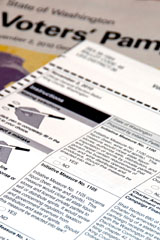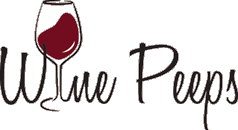Washington Wine Lovers: Vote “Yes†on I-1183
By John ~ October 26th, 2011.
 As Yogi Berra once said, it’s déjà vu all over again. About a year ago, I wrote a similar post recommending a “yes†vote on I-1100. Now we have I-1183 on the ballot, and some of you are asking for our thoughts and recommendation again. While the two initiatives have a similar primary objective of getting the state out of the liquor business and in sync with most other states, this year’s version, I-1183, leaves out some of the more controversial elements of the prior initiative that winemakers opposed, which I like.
As Yogi Berra once said, it’s déjà vu all over again. About a year ago, I wrote a similar post recommending a “yes†vote on I-1100. Now we have I-1183 on the ballot, and some of you are asking for our thoughts and recommendation again. While the two initiatives have a similar primary objective of getting the state out of the liquor business and in sync with most other states, this year’s version, I-1183, leaves out some of the more controversial elements of the prior initiative that winemakers opposed, which I like.
I-1183 keeps in place laws regarding payment for shelf space and cash on delivery, makes it almost impossible for most mini-marts to sell liquor (because of a square footage minimum), and maintains a revenue stream to the state in the form of a percentage of gross spirits revenue. [For the full text of I-1183, click here.]
In fact, in their Policy Brief on September 16, 2011, the Washington Research Council provided the following summary of the fiscal impact of I-1183:
“It is to be expected that independent analysts will come up with somewhat different estimates of the fiscal impacts of a measure as complex as Initiative 1183, and OFM’s (Office of Financial Management’s) estimates do differ somewhat from ours. We remain comfortable with the choices we made in modeling I-1183’s impact. In spite of the differences, the two analyses agree that the initiative will provide significant additional revenues to state and local governments.â€
Just as last year, the largest financial supporter of the initiative is Costco, and the major funding against I-1183 are the Wine & Spirits Wholesalers of America. Just as last year, what disappoints me the most about the campaign against I-1183 is what I believe is the disingenuous rhetoric about health and public safety. I-1183 is not about safety. California has private liquor sales rather than a state-controlled system, and yet California has fewer drunk-driving deaths per-capita than we have in Washington State.
I don’t believe for a minute that the wine and spirits wholesalers who are funding the negative ads want us to stop drinking or to drink less. They simply want to ensure that they continue to get their cut of virtually every bottle of wine and spirits sold in Washington State and not have their profit margins shrunk by having to negotiate with large retailers on price.
The other big question for me is what this initiative will do to wine and liquor prices. Melissa Allison of the The Seattle Times addressed this issue in an article published on October 1, 2011. Her conclusion was that a claim by the pro I-1183 group that passage of I-1183 would “bring more competitive prices to consumers†was mostly true. Ms. Allison said, “The pro-campaign is basically right. Some prices would fall, and maybe a lot of prices, given how heavily skewed the state would be toward large chains with big buying power.â€
As I’ve traveled around the country, I’ve been impressed with the wine, spirits, and specialty food superstores such as Spec’s in Texas, Beverages & More in California, Davidson’s in Colorado, and so on, and wished that we had something like them here in Washington. I-1183’s passage will go a long way towards making that dream come true.
In summary, it looks to me like passage of I-1183 will be better for me as a consumer, revenue positive for the state, and not be a danger to public safety as some ads have suggested. Please join me in voting “Yes†on I-1183.
Filed under: American Wine, Miscellaneous, Washington State Wine

 Wine Peeps is an independent wine blog dedicated to helping you get the most bang for your buck in wine. We do this through blind tastings of wine from around the world and calculations of
Wine Peeps is an independent wine blog dedicated to helping you get the most bang for your buck in wine. We do this through blind tastings of wine from around the world and calculations of 











A couple of quick questions, John.
How do you see the passage of this bill affecting the under 3000 case producers of wine in this state as they will have a new 10% tax levied upon them and could have shelf space seriously reduced in consumer outlets. Have you considered the “compliance” issues that the WSLCB will have in that there is no provision for additional compliance officers of which there are only 50 for the entire state. Is shelf price for alcohol really going to be cheaper for the public in that retailers will be paying a 17% tax on gross retail sales and distributor/wholesalers will have an added 10% for years one and two and then 5% for years thereafter. These taxes are historically passed on to the consumer.
I have read the entire initiative (pdf download) and it appears that there is a possibility for under 10k footage stores to sell alcohol if there is not a large retailer in “the area”. It is the verbage in quotes that is quite problematic. I do see that local entities will be able to fight such issues but then, money talks. Finally, I am having trouble finding the passage that refers to maintainence of the C.O.D. requirements for the purchase for retail of wine, beer and spirits in the state. Could you point out the section and paragraph for me.
Thank you,
Michael G.
Michael,
Thanks for your comments. I’ll try to cover them all, even though it’s much more than “a couple of quick questions.”
Q: How do you see the passage of this bill affecting the under 3000 case producers of wine…? A: The best answer to this comes from The Family Winemakers of Washington, an organization of 100 small wineries who have come out in favor of I-1183.
Q: Have you considered the “compliance†issues that the WSLCB will have? A: Yes, we have, and don’t see it as a major factor since we’ve already been selling wine & beer in grocery stores in Washington (i.e. checking ID’s) and I believe fines are being doubled for non-compliance.
Q: Is shelf price for alcohol really going to be cheaper for the public? A: Yes, according to the studies I’ve seen, as well as the article in the Seattle Times that I quoted in this post.
Q: Not really a question, but you are correct that it appears that there is a possibility for under 10k footage stores to sell alcohol if there is not a large retailer in “the areaâ€. A: I believe that this is a proper exception to be made in a remote rural area, which is where this is most likely to be applicable.
Q: Could you point out the section and paragraph for me [that refers to maintenance of COD requirements]? A: This is not a complete rewrite of the states liquor laws, so my understanding is that a subject not specifically mentioned is by default not changed.
Hope this helps.
John